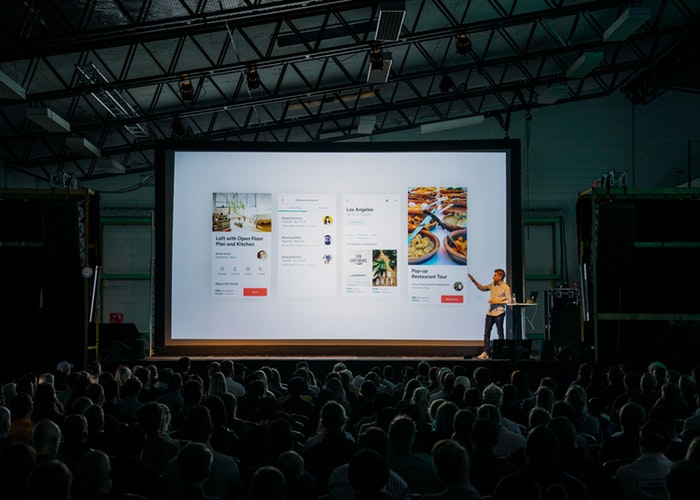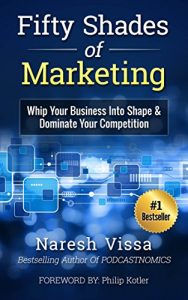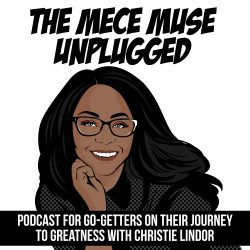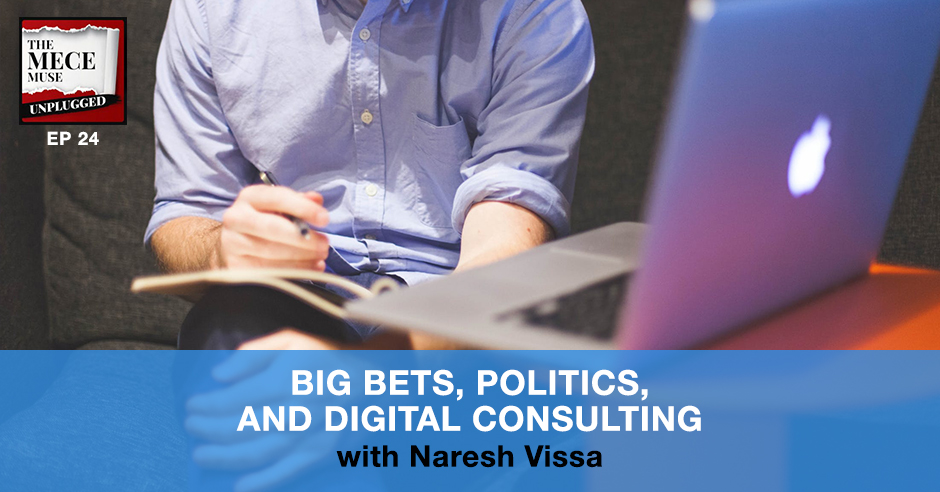AMA (Ask Me Anything) interview with Naresh Vissa, a digital marketing millennial consultant, CEO of Krish Media & Marketing, and a best-selling author of Fifty Shades of Marketing: Whip Your Business into Shape & Dominate Your Competition and Podcastnomics: The Book of Podcasting to Make you Millions.
Naresh turned down an offer from a leading management consulting firm to join a startup company and several years later, launched his own company. In this episode, Naresh and Christie touch on a myriad of topics including:
- How taking a big risk in turning down the management consulting offer from a prestigious firm to join an unknown startup paid off
- Naresh helped the Houston Rockets basketball management team select 2007-2008 draft picks in a remote internship through the use of digital and predictive analytics
- Embracing and exploiting the opportunities digital and its disruptive effects will have across every industry
- Forging into political consulting, the digitization of politics and how it impacted the 2016 U.S. elections, including the launch of Naresh’ newest book, Trumpbook: How Digital Liberals Silenced a Nation into Making America Hate Again
Listen to the Episode Here:
Podcast: Play in new window | Download | Embed
Subscribe: Apple Podcasts | Email | TuneIn | RSS | More
We will be doing a segment that I call AMA, Ask Me Anything. AMAs is when I have the utmost pleasure to connect with a seasoned consultant and talk about their journey to greatness. We have Naresh Vissa. He’s a millennial consultant, CEO, and Founder of Krish Media and Marketing, as well as a best-selling author. He takes the road less traveled in consulting. He turned down an offer from a reputable Big Four firm, decided to venture into the world of startups, then created his own firm. He’s foraging into political consulting, which I found very intriguing. We have a conversation about some of the things that he’s seeing out in the entrepreneurial space. What’s cool is Naresh came on the show and he showed up with gifts. He gave us links to free audio books of his two best-selling books. He’s got two books. One is called Podcastnomics, The Book of Podcasting.The second book is Fifty Shades of Marketing. You’ll be able to download those immediately and start listening to them. Let me know what you think. Drop me a line, MECEMuseUnplugged@Gmail.com.
Stay tuned for episode 25 when I get a chance to connect with another seasoned consultant. We have a conversation about the psychology of decision making. If you’re like myself, you always want to try and make the best decision with the best information and data and circumstances that you have in front of you. What I like about my conversation with my guest is that she brings out a cool technique. She studied decisions analysis at Stanford and has some cool points of views that you can start to take and use in your personal and professional life.
Interview with Naresh Vissa
Naresh, thank you for joining us on The MECE Muse Unplugged. How are you doing?
I’m doing awesome.
Before we get started with the interview, if you can take a moment and introduce yourself to the go-getters of the MECE Muse Unplugged?
I am the Founder and CEO of Krish Media and Marketing. I am also the number one bestselling author of two books on online and digital media and marketing called Fifty Shades of Marketing: Whip Your Business Into Shape &Dominate Your Competition, and the Podcastnomics, The Book Of Podcasting…To Make You Millions. Krish Media and Marketing is a company I founded about four and a half years ago. I’ve been completely on my own since then. I was in my mid-twenties when I got started, and it’s essentially an online business solutions provider and agency. It’s an online agency that offers any service you can think of in the online space, with the exception of mobile app development. I am also a partner in several online publishing businesses, specifically online financial publishing and getting started in real estate investing and political consulting.
Can you tell us a little bit about how you got started with Krish Media Marketing? I understand that you had a role or a job offer at a consulting firm and you turned it down to start the company. Maybe you can share a little bit about that story.
When I was in high school, I was editor of the school paper. I was also broadcasting high school football and basketball games. I wanted to work in the sports industry, specifically as a media professional whether it was a journalist, a PR person, or a broadcaster. I applied to colleges with the intention of getting a major in journalism, specifically broadcasting. Online and digital journalism, that’s where the trends seem to be going. I did end up going to school, got a degree in online and digital journalism, but also picked up two other majors, finance and accounting, while I was an undergrad. You go to college, you can have fun, make friends, but take your studies seriously and try to get as many majors as possible.
Many employers thought I was unfocused for doing three different majors, but it exposes you to more industries. That opens more doors. It makes you more knowledgeable. It develops a good work ethic in you, and all of these helped me in becoming an entrepreneur. As an entrepreneur, you’re not starting a business. You’re not creating a product. You are the marketing department. You are the HR department. You are the accounting department. You’re every department within your company, especially when you’re getting started. I went to school with the intention of working in the media industry, which I did. I was a reporter, producer, director, journalist in print, online digital, TV, and radio. The industry changed so much post-financial crisis, so I went back to graduate school, got a master’s degree from a leading business school in the country, and that was my introduction into management consulting. The big management consulting firms only recruit from the top fifteen to twenty business schools.

I was introduced to management consulting, went through the management consulting interview process with various big firms, ended up getting a couple of job offers, doing management consulting, both internal management consulting at large Fortune 500, Inc.5000 companies, and also at Big Four management consulting firms. I liked that a lot better than investment banking or working on Wall Street because it seemed more challenging. Surprisingly, a company that did hundreds of millions of dollars in revenue found me online. They found me on LinkedIn and they contacted me and said, “We want to hire you based on your LinkedIn profile to consult for us on a project that we are looking to get started on. Can you talk today?” I talked to them that day, and I was hired that day as a consultant. That gig, while I was finishing up graduate school, turned into a full time job. I did end up turning down the management consulting position that I had already accepted, joined this company, worked at the company full time for a couple of years, and then started Krish Media and Marketing. The rest is history.
When you turn down the offer and decided to go with the other company, can you share what were some of the factors that drove those decisions? Go-getters out there that are at that crossroads, they may be in the same position where they’re torn, not sure where to go, gotten offers maybe in the throes of recruiting. What would be some factors that may help you make your decisions that you can share?
The first thing that people need to look at is the money, not because of how much is coming through your wallet or your bank account, but because the more money somebody is going to pay you, the more that person believes in you or the more responsibility they’re going to give you. In this case, I did get a better offer, and the management consulting companies do provide very good offers for kids out of school. I don’t want to put that down by any means. The position I got was an internal management consulting role for a large Wall Street bulge bracket bank. This was post financial crisis. They had made some acquisitions. There were lots of banks that went under and they were bought up. I was going to be a part of that management consulting integration team that took care of many of these acquisitions or that consulted on many of these different acquisitions. I was able to circumnavigate about two or three years by joining an internal management consulting group because I was going to be working with a lot of ex-Big Four folks and also some ex-consultants who worked at other well-known management consulting firms, whether in accounting or technology or pure management consulting.
The offer I got from the other company, it was a much smaller company, they didn’t have a brand name, not as well known, they we’re a small business. They had probably less than 100 employees when I was hired, but they gave me a much better offer. Because they gave me a much better offer, they gave me a whole lot of responsibility. I was the youngest Director in that company’s history. They gave me a Director title because I was the Project Manager of the project that I was consulting on while I was finishing school. They gave me a lot of autonomy and freedom when it came to vacation, working from home, bonuses. I thought to myself, “Let’s give this a try.” They are not the brand name that I’m used to or that I went to graduate school to attain, but if it doesn’t work out for any reason, I can always go back. I can always go back to the bank or the management consultancy and work that same job. It ended up paying dividends and changing the trajectory of my career forever.
When you reflect on that decision and it did pan out, what would be some lessons learned from it that you would share in terms of advice of how it helped you turn it down? I like the fact that you said you knew it wasn’t a name brand. Sometimes younger consultants, or even people that are aspiring to be consultants, strive for the name brand. The fact is it was the opportunity that outweighed the name, and given what the experience and the autonomy. What would be some of the lessons learned that you would share with someone?
There was a risk in what I did. I had to renege on a contract that I signed with this bulge bracket company or the management consulting position. Reneging is an issue for students, not necessarily with seasoned veterans, because it happens all the time. People leave all the time for various reasons, but reneging is a big deal with the university. I went to Duke University, and I was very transparent about what was going on. I told the Career Center and the folks there that I got a better opportunity and I stated my reasons. My advice to people is that they have to do what’s best for them. As a student, you’re very naïve. You haven’t worked a day in your life. You don’t know anything about negotiating or even loyalty. You have to do what’s best for you. You can’t accept a job that pays you half of what another job might give you and say, “I need to be loyal. I need to stay at this shop.”
One lesson that I learned is you have to do what’s best for you. When you do what’s best for you, you’re doing what’s best for everyone involved. Had I stayed at the original company, there’s a good chance that I would’ve gotten burnt out or I may not have been as happy, or I would not have been able to execute on what I signed up for. I’m happy looking back that I didn’t take that job because I’ve realized over the years that I’m not a corporate guy. I am not one who deals well with bureaucracy. I need to be either working for myself or working with a smaller company that does well. I tried the whole corporate thing at major bold bracket banks, major media firms. Personally, while it may have worked out on the performance review or with other colleagues, I did not find much meaning in that type of work. I highly recommend that people, when they’re looking for positions or for jobs, they keep all their options open and they’d be as transparent as possible.
I understand that you also helped the Houston Rockets pick their 2007 and 2008 NBA draft picks. I am so intrigued by that. I would love to hear the story of how that happened.
I brought up my interest in sports and getting involved in the sports industry. In 2007 and 2008, I was an intern for the Houston Rockets. It was a remote position. The Houston Rockets revolutionized the sport of basketball because of their use of statistical analysis to aid in their decision making. They hired some folks who specialize in data science and computer science because they took this effort very seriously. Part of that meant that they had to hire a bunch of unpaid interns to log data, to watch a lot of video, and to log data on how many threes a player took or how the player acts and pick and roll coverage or where this player takes his shots
They looked at all data, and I was one of those minions who was logging a certain set of data and providing that data to the General Manager and the Senior Vice President of Basketball Operations so they could get that data, put it into the models, and evaluate players accordingly. It was an online digital remote position. It didn’t require me to go anywhere to travel and to watch in person. Everything was in a software, which at the time, they were one of the only users of this software. Now, all 30 teams use the software. That’s how I got involved with the Houston Rockets and the players who I tracked and also recommended ended up being selected by the Rockets in the 2007 and 2008 NBA drafts.
What I’m hearing from this story is don’t underestimate when you see an internship that maybe remote. People feel like they’re not getting an in-person experience. That doesn’t always necessarily mean that it’s not as valuable. That was the takeaway I had from your story.
People do not think about the remote and digital possibilities that are out there. I’m a digital guy, but the online and digital economy has grown. It is the present, and it’ll continue to be the future, so you don’t have to go into an office to work. Even if it’s a physical game like basketball, they make money by fans going into the stadium and watching the players and the players are physically there and shooting a ball into a hoop. You can still absolutely get an internship or even a job. The question that some might have would be, “How did you get this internship? How did you make the connections? How did you get your foot in the door?”
It was a mix of things. I knew some people who knew the front office at the Houston Rockets. I also randomly reached out via email, introducing myself to the Assistant General Manager who have been hired. He’s now the General Manager and President of Basketball Operations. I found his email address and emailed him and welcomed him to the city when he was hired. When he was promoted to General Manager, I already had the in. When I even went to a game, I shot him a note saying, “I’m going to be at this game. Feel free to stop by. This is where I’m sitting.” He came, sat by, and talked to me for ten or fifteen minutes. That’s how I got my foot in the door as a high school student.
You mentioned digital and the state of digital. What are some of the thoughts you have on the state of digital from your expertise and experience being in media marketing? I would love to hear your sound bites on how go-getters should start to prepare for that. If you’re younger, looking to prepare for the future from a digital perspective, how would you say folks should do that?
Digital is a very good thing, and it’s getting a lot of criticism on moving forward because there’s a fear. There is a fear of jobs being destroyed and job replacement. What I do today with Krish Media Marketing, with my books, and with my businesses, none of this was available years ago. My job did not exist years ago. Twenty years from now, my job is going to be completely different than what it is today. That’s a good thing. When I tell you that my job did not exist years ago, but today it did, that shows progress. Are there jobs that aren’t available today because the economy doesn’t null it. You look at what technology has done. Technology has created Uber. Look at how many jobs Uber has created when it comes to independent contractors driving people. That did not exist six or seven years ago. You look at the iPhone, and look at the ecosystem that the iPhone has created. The iPhone created Uber, the iPhone created Snapchat, but it’s also the email, the apps, Siri, and the internet. The iPhone has done so much to improve lives personally, but also improve the way business is conducted and executed.
Technology, online, digital. Those are all good things. I want to state that artificial intelligence is going to be the future and it’s going to hit us very hard for the better. Artificial intelligence is going to replace any functions that act as memory devices or any functions that perform perfunctory tasks. Let’s say you are a doctor. A doctor, particularly a physician, is somebody who is collecting a lot of quantitative and qualitative information, and then making a judgment based on that information. A lot of these positions, which is considered to be one of the most stable positions of all, they’re going to downsize. They are not going to be eliminated altogether, but they’re going to downsize because you will be able to have a computer performing these information processing and perfunctory tasks. We all use computers. If we use our phones, we use our computers.
We do that because the computer does so much for us. When we put an address into our GPS, the GPS will get us to the place where we want to go. We could blindly get into our car and start driving, but we would have no idea what we’re doing. We trust the GPS. Is the GPS wrong sometimes? Yeah, once in a while. I’ll say probably 5% of the time. It hasn’t been updated or it’s an old address or it’s a new address and the GPS can be wrong, but in general, computers are good. They’re not people, they don’t have emotions, they don’t get angry. In the case of self-driving cars, the computer isn’t going to get drunk. The computer isn’t going to get tired while going on a ten-hour road trip. These are examples of the future of artificial intelligence and the future of online and digital business.
What’s going to happen? We’re going to be replaced by computers. Certain jobs are going to be replaced by computers. When banks came out with ATM machines, it was assumed that the ATM machines will put bank tellers out of business. They could even put regular bankers out of business as well. The bank said, “Let’s give it a shot. It’s a lot cheaper to open up an ATM and have people get their cash from there.” What ended up happening was all these ATMs opened up, they were created, people started using them, and the banks had to hire more people, not to manage the ATM, but because these people were interested in other services that the bank has to offer, whether it was opening up a savings account or opening up a CD or getting a mortgage loan or a small business loan. The ATM served as a lead generator, and then the bank was able to cross promote those customers. They reduce the number of people who weren’t bank tellers, but they increased their workforces more because there was more demand for other products.
Technology is a good thing. If you work at a job where you’re not using technology or where you’re not online, you’re not getting involved digitally, you need to catch up because that’s where we are today. If you’re not active in the future using such media, then you’re going to be in big trouble. Your industry is going to be in big trouble. Blockbuster, for example, getting completely obliterated by the Netflixes of the world because they said, “Who’s going to go online to watch movies? Why would somebody want to pay a monthly subscription to watch movies and TV shows?” Xerox Corporation, the auto industry. In the United States, there are all sorts of industries and companies that did not adapt to online and digital, and they’re either paying for it now or they’re not even in business anymore.

You mentioned about political consulting. I find that so intriguing, and it sounds like you’re looking to maybe make a transition in the space. Maybe you can give us a little bit more about what you’re thinking. You also have a book coming out. Maybe share a little bit about that.
The political consulting is something that has fallen into my lap and I want to explore it. Even starting my business, Krish Media and Marketing, it fell into my lap. It’s not something that I woke up saying, “I want to start my own business and do my own thing.” In the case of political consulting, my background in online and digital, it’s not applicable to businesses. It’s applicable to people and into politics as well. We’ll see in our elections, 2008 through 2016, the candidates who utilize online and digital platforms were the ones who ended up winning. President Obama was the first major political candidate to actively run social media and connect with his followers and also utilize solid email marketing.

In my book, Fifty Shades of Marketing, I get into more detail about how the Obama campaign, the people were running the campaign, did a tremendous job of collecting leads via email and also connecting with those leads and getting them to go out there and vote. He jump-started the entire idea of the digitization of the political process. In 2016, we had Trump who took what Obama did, did the same thing, and then added a more personal element to it with social media and being incredibly active on social media and connecting with not just his followers but also his detractors with social media. He’s still doing it as President, for better or for worse. A lot of old school good old boys’ networks in Washington, DC, they know next to nothing about online and digital. They don’t have websites. They don’t know what a podcast is. They have no idea how to create a mailing list. The way things are done in DC, the idea of getting so many congressmen and congresswomen into a building to vote on something or to debate something, it’s very old school. It’s very archaic. It’s antiquated. There’s no point in doing that.
Based on what I’ve learned with my experiences and successes and failures in online and digital media and marketing and e-commerce business, a lot of these principles are applicable in the political sphere. As a result, a lot of this has fallen into my lap. I’ve been contacted by various former politicians, former political advisors on many different sides of the political spectrum, on doing online and digital work for them. Whether it’s rebranding themselves because of a scandal that got them removed from office or if it’s, “I want to start my own podcast. My political career is done and I want to stay active. Can I start my own podcast? I want to write a book about my experiences, how do I do that if none of the big publishers think I’m worthy enough to publish through them?” That’s what I’m doing working with a couple of people.
I do have a book for the one-year anniversary, and it is a controversial book. The book is called TRUMPBOOK, and that’s a play on words to reference Facebook, so it’s called TRUMPBOOK. The subtitle is How Digital Liberals Silenced a Nation into Making America Hate Again. The idea is taking a strong look at data that is publicly available about the role that digital media and digital platforms played in getting President Trump elected. What I’ve found was that it was not Trump supporters or his voters who got him elected, it was his detractors. The bulk of those detractors are people on online and digital media. They were also in the mainstream media. There was a little bit of grass roots resistance as well, but online and digital played an incredible role in generating free publicity for Donald Trump in generating in the equal but opposite reaction that ended up getting him elected. Anybody who looked at the data, the nitty-gritty data, would have told you that he would have been elected president. But the day after the election or the night of the election, there was almost shock within the country because so many people did not expect it, but the data would have told you otherwise.
I wish you the best with the political consulting services and the book. I would love to have you come back on the show. Hopefully, you’d be interested in coming on the show in the future. The digitalization politics alone, it was a huge topic.
The work that I’m doing with some of these political folks and former politicians is very basic online and digital stuff. I’m not saying that I have any interest in getting involved as a candidate or anything, but as a hopeful political consultant, my strategy is these candidates need to go digital. Washington needs to find ways to cut back on spending, cut back on travel and hotel and expenses and food. They can still accomplish everything they need to do by going digital, and they can save a lot of money. It would be more efficient. More would get done when it comes to legislation or lawmaking in general.
These people don’t know anything. These are supposed to be our leaders who know everything, and when it comes to online and digital, they know next to nothing. They’re wasting so much money on both sides as a result. That’s part of the reason that got me involved because I’ve gone through some political leadership programs in Tampa Bay. I’ve seen how things operate, parties aside, politics aside, and this is something that needs to be done. The adoption has taken longer than any other industry. That’s why I want to enter into this political consulting space.

If people are trying to get a hold of you, would you be able to give contact information? We’ll post it on our site as well, and our show notes, but share how people can do get a hold of you?
NareshVissa.com. Get my free newsletter. I share tips and tricks on the online and digital space. If you get on my newsletter, you’ll receive a welcome letter. If you don’t receive it for any reason, email me and I will send you a free copy or free copies of my book TRUMPBOOK. I will send a free copy of the book to you. If you’re interested in my company, KrishMediaMarketing.com, it has all the information you need to know about the company, what we do, and the services we offer.
If you have a particular question or feedback about the show, feel free to drop us a line at MECEMuseUnplugged@Gmail.com. I’d again like to say thank you to Naresh for being a guest on the show and thank you my go-getters for tuning in. This is Christie Lindor signing out for The MECE Muse Unplugged pop-up podcast. Here’s to your journey to greatness.
Links from today’s episode
- Krish Media and Marketing
- Podcastnomics, The Book Of Podcasting…To Make You Millions
- Fifty Shades of Marketing: Whip Your Business Into Shape &Dominate Your Competition
- TRUMPBOOK
- NareshVissa.com
- KrishMediaMarketing.com
About Naresh Vissa
 Open networker, so all invitations are welcome…
Open networker, so all invitations are welcome…
I have a full service online and digital solutions provider (www.krishmediamarketing.com)… work with some big names in the financial industry. I’m fortunate to have collaborated with the best direct response companies in the world.
Launched an online radio network generating six-figures in monthly revenue
Managed the production and marketing for the first online physical precious metals retail platform exchange
Two-time #1 bestselling author and national columnist
Been featured on USA Today, Yahoo!, Bloomberg, MSNBC, Huffington Post, Business Week, MSN Money, Business Insider, India Today, Hindustan Times


